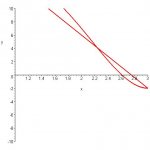The problem:
Let g(x) = x[sup:10vuzol6]4[/sup:10vuzol6] – 4x[sup:10vuzol6]3[/sup:10vuzol6] – 2x[sup:10vuzol6]2[/sup:10vuzol6] + 12x + 7. Show that the equation g'(x) = – 8 has a solution in the interval (1, 3).
My work so far:
Consider the function h(x) = g(x) + 8x. Then h(x) is also continuous on [1, 3] and differentiable on its interior. By the MVT, there is a point q in the interior such that h(3) – h(1) = (3 – 1)h'(q) = 2h'(q).
h'(x) = g'(x) + d/dx (8x) = 4x[sup:10vuzol6]3[/sup:10vuzol6] – 12x[sup:10vuzol6]2[/sup:10vuzol6] – 4x + 12 + 8 = 4(x[sup:10vuzol6]3[/sup:10vuzol6] – 3x[sup:10vuzol6]2[/sup:10vuzol6] – x + 3) + 8
= 4(x + 1)(x – 1)(x – 3) + 8 ? – 8 + 8 = 0
? x = – 1, 1, or 3
I think I'm on the right track here, but I'm not sure what the next step is. Any hints?
Let g(x) = x[sup:10vuzol6]4[/sup:10vuzol6] – 4x[sup:10vuzol6]3[/sup:10vuzol6] – 2x[sup:10vuzol6]2[/sup:10vuzol6] + 12x + 7. Show that the equation g'(x) = – 8 has a solution in the interval (1, 3).
My work so far:
Consider the function h(x) = g(x) + 8x. Then h(x) is also continuous on [1, 3] and differentiable on its interior. By the MVT, there is a point q in the interior such that h(3) – h(1) = (3 – 1)h'(q) = 2h'(q).
h'(x) = g'(x) + d/dx (8x) = 4x[sup:10vuzol6]3[/sup:10vuzol6] – 12x[sup:10vuzol6]2[/sup:10vuzol6] – 4x + 12 + 8 = 4(x[sup:10vuzol6]3[/sup:10vuzol6] – 3x[sup:10vuzol6]2[/sup:10vuzol6] – x + 3) + 8
= 4(x + 1)(x – 1)(x – 3) + 8 ? – 8 + 8 = 0
? x = – 1, 1, or 3
I think I'm on the right track here, but I'm not sure what the next step is. Any hints?

